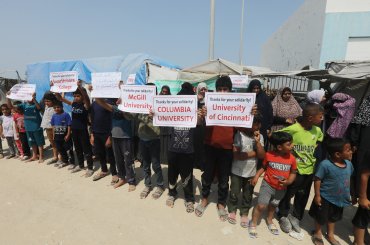The latest London Review of Books has a wonderful piece by Jeremy Harding reviewing two biographies of Charles De Gaulle. It is easy to admire De Gaulle now as a great leader and supporter of decolonization; what I never knew was how difficult was De Gaulle’s rise. The Allied powers looked on the French resistance with great suspicion, and on De Gaulle as a headstrong nationalist believer with too much charisma. Roosevelt and Churchill sought to displace him with more pliable types. And De Gaulle struggled to unify the resistance– indeed to build an idea of French identity.
I’ve collected a few excerpts below that had me thinking about the analogy to the Palestinian resistance, Palestinian nationalism, and the leader of that struggle, Yasser Arafat. In the end it is hardly surprising, as Harding shows, that Arafat himself made the analogy. This is what historical study should be about, looking at the past not to explain our own struggles, but to shine a light on them, and gain inspiration from them. When you read this piece and then hear Palestinians dismiss the P.A. as Vichy or Collaborationist, you understand that they are not just rejectionist, they are operating in a strong historical framework. Harding:
By the end of July [1940] only five or six thousand of De Gaulle’s compatriots had answered his appeal to join the Free French. The question for many unfree French had been to effect a realistic salvage of their country and swallow their national pride: from this angle, De Gaulle’s stance looked reckless and irresponsible…
As his voice became more influential and people began to tune in to the broadcasts, spinning the dial away afterwards, so that the wireless wasn’t set to an incriminating wavelength, he issued calls for mass displays of ‘symbolic resistance’ which worked directly on the stifled patriotic impulse and, increasingly, on the republican imagination of his listeners…
Churchill could see the merits of De Gaulle, while Roosevelt held him in barely disguised contempt as a dangerous marginal. Notwithstanding his affection for France, Roosevelt felt in 1942, as Stalin did, that it would have to adjust to a new status in the world, of which De Gaulle lacked any proper sense…
The PCF [French Communist Party] was yet another in a ring of rivals surrounding the general and, as Hazareesingh says [Le mythe gaullien by Sudhir Hazareesingh], De Gaulle was struggling on two fronts, hoping to assert that his was the only legitimate voice speaking for France on the international stage, while coming to an accommodation with the non-Gaullist strands of the Resistance.A unified Resistance, one of the most vexed areas of the picture, became a possibility towards the end of 1942, when the PCF sent delegates to London and agreed terms with De Gaulle; Free French forces were by then a respectable size, around 40-50,000 strong and a credit to the general. That left the Allies. ‘As soon as America entered the war,’ De Gaulle noted, ‘the Free French were eliminated from the Allied conferences.’ The 26 signatories of the ‘Declaration by United Nations’ against the Axis in 1942 did not include France; De Gaulle was not invited to Washington a few months later..
By now, [42] the Americans believed they might have found an alternative to De Gaulle: General Henri Giraud, a senior officer who had been captured by the Germans and subsequently escaped – a Vichy loyalist, wanted by the Reich and ready to do the Allies’ bidding….
the way De Gaulle saw it [to Churchill:] Ought Washington really to be making all the decisions, including whether or not to deal with the enemy? ‘You allow the Americans leadership of the conflict when you should be exercising it, morally in any case. Do so! European opinion will support you.’ But already Churchill had put De Gaulle’s broadcasts from London on hold and asked the president whether he should scrap them altogether if Washington had another man in mind. ‘I hope you get to Berlin before the Americans,’ De Gaulle told the Soviet ambassador in London…
When he met De Gaulle for the first time in Casablanca, Roosevelt told him he should not imagine he was the sole legitimate representative of the French, since he hadn’t been elected. Neither had Joan of Arc, De Gaulle replied…
the difficulties he experienced in 1942-43 would confront many of the liberation movements in the European colonies after World War Two: the rocky path towards recognition as ‘sole legitimate representative’ of a people; the ambiguous presence of a puppet regime or rival ‘liberators’; deathly partisan feuding; the epic contest with powerful backers. Together, Fenby’s account and De Gaulle’s own war memoir read as a draft schedule for modern independence struggles in the rest of the century; they also anticipate Washington’s wishful thinking, which persisted through the Cold War, when the forces it backed in the Third World weren’t always the ones to prevail.
De Gaulle was not an anti-colonial: throughout the war he had been ready to take on the British when he felt they were undermining French interests in Lebanon and Syria, and he clung tenaciously to the idea of a French neo-colonial commonwealth of African states after their independence in 1960. He had presided over Algerian decolonisation not because he believed it to be just, but because he had come to grasp that hanging on would do immense damage to France. Nonetheless, he knew what it was to embark on a national liberation struggle for a people under occupation, raise an army against the enemy and face down a superpower.[*] Gradually, his name became associated with decolonisation struggles as he attempted, without much success, to find a role for France as a buffer against US foreign policy; as president, during a speech in Phnom Penh, he would have harsh words to say about the American presence in Vietnam, the ‘national resistance’ it had fuelled in the south, and the folly of Washington’s war.
[*] Hazareesingh has pointed out in a recent issue of Foreign Policy that Arafat used to wear a cross of Lorraine.

